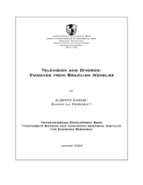Television and Divorce: Evidence from Brazilian Novelas
Date
Jan 2009
This paper studies the link between television and divorce in Brazil by exploiting variation in the timing of availability of the signal of Rede Globo -the network that had a virtual monopoly on telenovelas in the countryacross municipal areas. Using three rounds of Census data (1970, 1980 and 1991) and controlling for area fixed effects and for time-varying characteristics, the paper finds that the share of women who are separated or divorced increases significantly after the Globo signal becomes available. The effect is robust to controlling for potential determinants of Globos entry strategy and is stronger for relatively smaller areas, where the signal reaches a higher fraction of the population.




